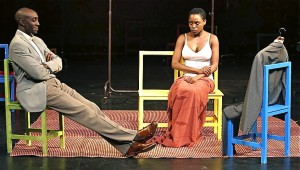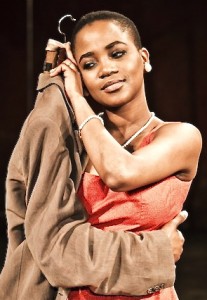Woody’s [rating:4]

Extraordinary actors Nonhlanhla Kheswa (right) and Ivanno Jeremiah and an ordinary suit star in “The Suit.” Photo by Pascal Victor/ArtComArt.Photo by Pascal Victor/ArtComArt.

Nonhlanhla Khesa effectively uses her arm to romantically caress herself, puppet-like in “The Suit.” Photo by Johan Persson.
Racism, as depicted in the apartheid-fouled Johannesburg of “The Suit,” is downright ugly.
And brutal.
Palpably tragic.
Worst of all, it’s reflective of today’s racism in an America that pretends it’s integrated when its all-too solid walls of bigotry remain intact.
It’s a fascinating coincidence that “The Suit” opened at San Francisco’s A.C.T. Theatre only one day after L.A. Clippers’ owner Donald Sterling was fined $2.5 million and barred for life from the National Basketball Association for overtly anti-African American statements.
Though peppered with multiple instances of levity, “The Suit” is a solemn theatrical time bomb intentionally ignited by Peter Brook, an 89-year-old British director.
Brook clearly stages the kind of in-your-face prejudice I’ve always found abrasive and offensive.
Adapted from a Can Themba short story, the 75-minute drama thrusts into the foreground a husband who, after discovering his wife in bed with a lover, insists she take with her wherever she goes the suit her fleeing sex partner left behind.
It becomes, essentially, a scarlet letter, the traditional sign of sin.
Over all, the play exudes a surreal, fable-like quality, abetted by a Dali-esque set consisting of unadorned (yet colorful) wooden chairs and bare clothing racks.
But the extraordinary three-actor cast seamlessly integrates poignancy, music and pantomime.
Nonhlanhla Kheswa, Johannesburg native and veteran of Broadway’s “The Lion King,” is outstanding as the adulterous Matilda. Her body language and elegiac voice unerringly convey how she wears her punishment.
Ugandan-born Ivanno Jeremiah adeptly plays her humiliated, vengeful spouse, Philomen, middle-class wage-slave who’s suffered daily abuse from a system that downgraded a whole black population to second-class status.
New Jersey-born Jordan Barbour skillfully fills in the gaps as he jumps from role to role.
Musical interludes range from traditional African melodies to timeless American jazz pieces such as “Feelin’ Good,” the Nina Simone standard, and the painful Billie Holiday classic about lynching, “Strange Fruit.”
To prevent my review from being disingenuous, I must mention that the touring production from Théâtre des Bouffes du Nord is imperfect.
Even heavy-handed sometimes.
As when the fourth wall is broken by actors who provide the audience with invisible joints, or when folks are invited to represent white participants onstage at a shebeen, a speakeasy-like party.
Additionally, Brook, whose “The Empty Space” has been a theatrical bible for generations, has paced the play so deliberately I twice felt compelled to check my watch.
None of that, however, undercuts the emotional impact of the show.
Besides, “The Suit” contains numerous magic moments.
When, for instance, Matilda puts one arm into the empty outfit and, puppet-like, achingly caresses herself as if it were still being worn by her absent lover. When she sings, in Swahili, an upbeat song that’s crushed by Philomen with only a few words. When she foreshadows crucial action by dedicating a melancholy tune to “each and everyone who cannot get what they want in life.”
Or when the actors pantomime being on a rolling commuter train.
When trumpeter Mark Vavuma wrings every possible emotion from his muted horn. Or when Mark Christine underscores the play’s tragic ménage à trois via a soulful Bach “St. Matthew Passion” on a solo compact synthesizer.
“The Suit” is set in the 1950s in Sophiatown, an overcrowded black appendage of Johannesburg that actually was bulldozed.
With more than 65,000 blacks forcibly removed.
I, frankly, was grateful the stream of real 1950s violence was referenced but not shown onstage. It was surely enough just to envision each of a black man’s fingers being bloodied, and his being shot 34 times.
The first-impression simplicity of “The Suit” is purposefully deceptive, making its vivid ending even more powerful, more numbing.
The opening night audience, in fact, seemed so stunned it took it a few seconds to rise for a well-earned standing ovation — and then it did so almost in slow motion.
“The Suit” plays at the American Conservatory Theater, 415 Geary St., San Francisco, through May 18. Performances Wednesdays through Saturdays, 8 p.m.; Tuesdays, 7 or 8 p.m.; matinees, Wednesdays, Saturdays and Sundays, 2 p.m. Tickets: $20 to $120. Information: (415) 749-2228 or www.act-sf.org.


